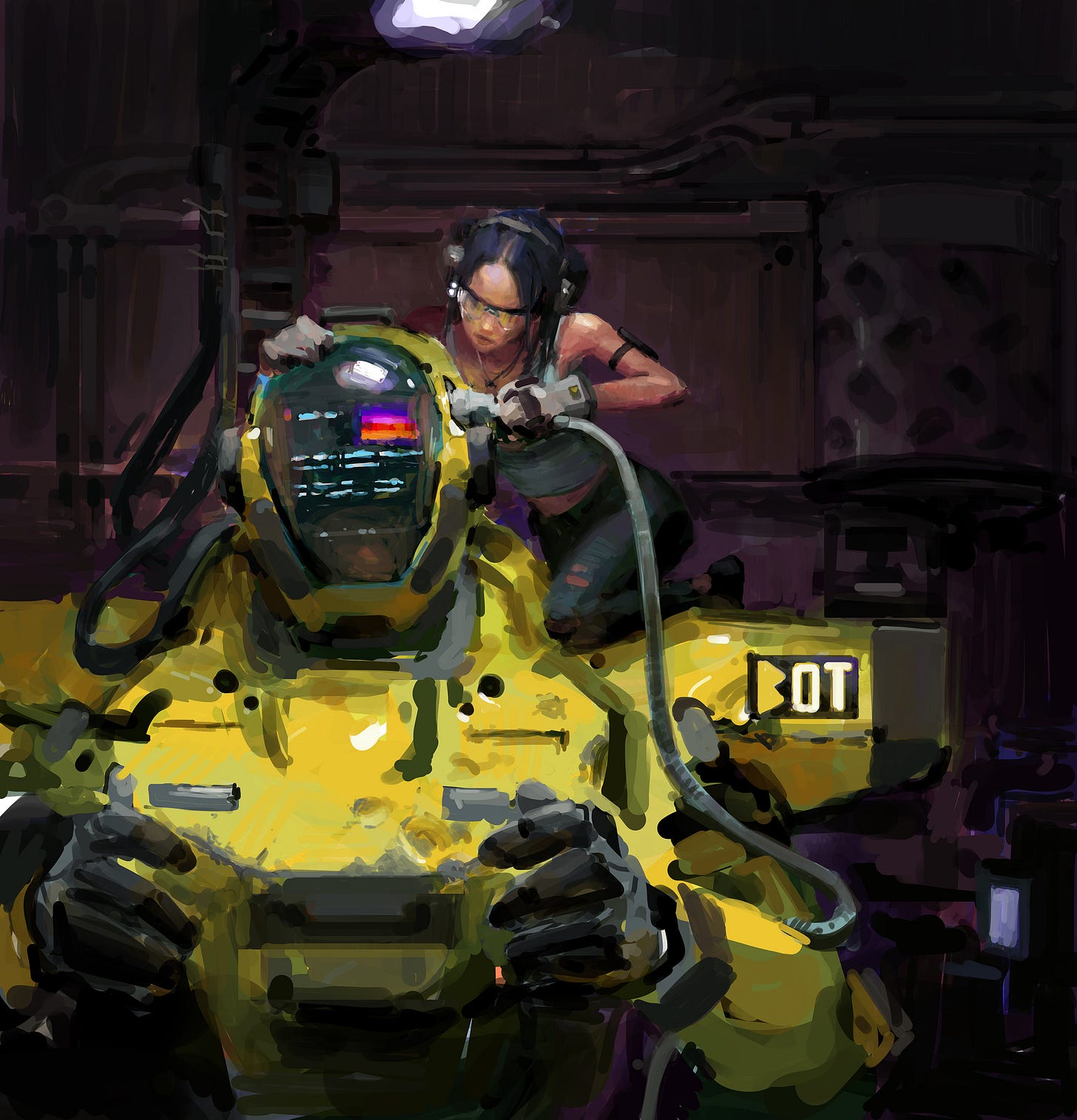The Onymity Question
A love letter to my readers, delivered at the masque
Some time ago I took leave of my adopted homeworld, returning to the Silent Planet of my birth via a portal in the Valley of Headless Men. The portal, a relic of some ancient and profane science, is hidden in a lightless, bone-strewn cave, its walls carved with obscene pictograms depicting the savage rights of forgotten alien gods. Emerging into the mist-shrouded valley, I navigated down the Nahanni river, engaging in a game of wolf and deer with the tribe of cannibal revenants that haunt the valley, the details of which I shan’t relate here. Hungry, exhausted by the long slog through the crushing grip of this heavy world, burnt by the wind and the chill, and nursing a wound in my shoulder from a wendigo that had moved much faster than I’d expected given the exposed bone visible through the rotting flesh of its legs, I found my way back to civilization, only to discover a world greatly changed in what I had thought a short absence.
It was not changed for the better.
A great plague had descended on the land, a sickness not of the body but of the soul. This shade cast a pall of despair and enervation over the world, visible in the hunched shoulders of the sickly populace as they shambled listlessly about, entranced by the black prisms in their hands; in the nameless, aimless anxiety in their gaze, when on occasion they dared glance away from their onyx crystals; in the oppressive ugliness of the blocky, unadorned buildings that squatted on the land.
Something horrible had happened while I’d been gone.
I made my way as quietly and unobtrusively as I could towards the old border between the northern dominion of the British Crown, and the republic of free men that I hoped still existed to the south. The border remained, but little else. The same tenuous, vampiric miasma had penetrated even there.
And so, in the hopes of understanding the nature of this intangible horror that had possessed this unfortunate world, I acquired a black mirror of my own, and entered the avenues of bottled light and channelled lightning to which all attention and knowledge has migrated.
Eventually, I found my way to Substack.
That was three months ago, more or less. Since then I’ve written something like 95,000 words across 37 posts (counting this post, not counting Substack’s obligatory ‘coming soon’ post, and assuming 2500 words as the average post length). That’s practically a book.
Last night I hit the 1000 subscriber milestone. I suspect the podcast appearance on MindMatters1 had a lot to do with that ... I picked up about 100 subscribers since it went live a few days ago2. The blog’s first post, The DIEing Academy, was published on April 10th, or 101 days ago, for an average subscriber growth rate of 10 per day.
A thousand subscribers in a bit over three months is pretty good, I think (not that I have much basis for comparison, it’s not like I have access to the stats for other substacks).
This seems like a good opportunity to say a few words about the strategy I followed in building this subscriber base. So far as I can tell, the usual method is to promote one’s work on social media, sharing it on Facebook, Twitter, and so on. I haven’t used Facebook in several years, and deactivated my account over a year ago; I have a sort of vestigial presence via Messenger, which I maintain so family and friends can get in touch, but the platform itself was simply too professionally dangerous given my propensity for contrarianism and debate. As to Twitter, I’ve had a few short-lived anonymous accounts over the years, which I kept losing due to those pesky community standards, and frankly I gave up on that platform some time ago.
Instead, I decided to use Substack itself as a social network, simply by looking for interesting blogs and participating in the conversations in the comments section. That’s been rewarding in its own right, and it seems to have worked pretty well. My reasoning was that people writing comments obviously already have Substack accounts, and can therefore subscribe more easily if they feel the desire; they’re also the most likely to be engaged, and to write comments of their own.
Given how active the comments section has been I think that strategy has proven itself. Honestly, my comments section is my favourite part of this project. A group of highly intelligent, perceptive, and weird-ass motherfuckers have been collecting in there, and it’s exactly the kind of crowd I like to hang out with. Some of your comments rise to the level of essays in their own right, with some incredibly perceptive insights being shared. Further, so far as I can tell, it’s an ideologically broad base – libertarians, reactionaries, old-school leftists, post-liberals, esotericists – which is exactly the kind of eclectic company that makes for a challenging, stimulating conversation. I’m genuinely honoured that you all take the time to engage at this level.
All that said, I’d be remiss if I didn’t mention the role that recommendations have played, which has been substantial. That feature seems to have been rolled out right around the time I started, so I’ve benefited from it right from the beginning. All told, 450 subscriptions have been generated by this feature, so slightly under half. To those who have been recommending me, I can’t thank you enough.
Lest you think that goes one way, my own recommendations have generated just shy of 900 subscriptions, which I’m also very happy about because every one of you deserves that attention.
A while ago I promised Winston Smith that I’d address the pseudonymity question. We’d both recently been taken to task in the comments by the same individual, who seemed to take it as a form of cowardice that we hide behind noms de guerre. I don’t know that I have anything particularly novel to say about this, but it’s worth talking about, and given that this post is already metacommentary this seems like a good place to bring it up.
There are three ways to engage with the world through the written word.
The first is onymity – to do so under your ‘real’ name, which is to say the name bestowed upon you by your parents at birth, the name by which your employers and the government know you. It wasn’t long ago that facefags were a rarity on the Internet: in the old days of BBSs and IRC no one used their real names, but the advent of Facebook normalized the idea of putting your thoughts out there under an identity that can be tied back to your place of employment and your residence. Using your real name is all well and good if you don’t have anything particularly spicy to say ... for instance, if your main goal is to share pictures of your cat on her birthday. If you want to say something heterodox, something which challenges the prevailing attitudes or beliefs, then you open yourself to ridicule or even professional consequences should your naughty words be traced back to you.
Even those self-employed as professional gadflies observe certain limits in what they say under their own names. The pressure of societal opprobrium is intense, and it leads to internal censorship. “What would Aunt Martha say at Thanksgiving? Hmm, nah, I don’t want to deal with that, best keep this spicy thought to myself.”
Now, some people are totally comfortable taking the heat that comes from expressing crimethought out in the open. I applaud those who do. They’re willing to suffer whatever consequences come their way, and their bravery serves an important function in society by pushing ideas that challenge normative dogmas. For a beautiful defense of onymity, as well as a story containing a happy ending despite the inevitable consequences of outspoken defiance, see here:
On the other end of the spectrum there’s anonymity, of which 4chan is the preeminent example as the default option is for posters to be entirely anonymous (thus, their habit of referring to one another as ‘Anon’). The overwhelming majority of the content on 4chan is the digital equivalent of wall graffiti in the men’s room, which is a large component of its darkly seductive allure. Severing all connection between identity and expression has a number of advantages. Secure in the knowledge that there is no possibility of embarrassment, people say what they genuinely think; even if what they genuinely think at the moment is basically, ‘it would be funny to troll the board by saying this ridiculous thing’, it’s still genuine in the sense that the internal censor is entirely removed. This enables the collective id to break free through the shell of the superego, exposing the raw collective unconscious of humanity. Anon becomes, not no one, but everyone – a superposition of humanity’s group psyche.
The other advantage of total anonymity is more subtle, but more profound. No one post is privileged over any other by the identity of its writer; anonymous posters, by their very nature, do not build audiences; there is no such thing as clout. 4Channers like to say that there are no girls on the Internet, which really means that on 4Chan you can’t use your identity to buttress what you say; while there may be girls on the Internet3, there certainly aren’t any credentials on an anonymous forum. The result is that the posts that stick around, that get screencapped, saved, and reposted as images, are only those that are especially insightful, interesting, funny, or deep. Anonymity diverts attention from the arguer, and focuses it firmly on the argument.
Pseudonymity is in the middle between the two – those of us writing under pen names establish an identity, and can therefore build a reputation and, hopefully, an audience, but we do so with our secret identities at least partially protected from the consequences of our masked antiheroism. Namefagging gives us much of the freedom that Anons have to be outrageous and provocative, in a way many of us would hesitate to do under our own names ... particularly in the current para-Victorian atmosphere of censoriousness and rigid social conformity, in which the smallest public step outside of the approved bounds of discourse invites savage reprisal.
There are downsides to pseudonymity. It’s a much more vulnerable defense than anonymity. Let enough personal details slip, and a dedicated sleuth can often put the clues together and establish your real-world identity – once doxxed, one faces the full set of consequences that one would have faced for posting under their ‘real’ names. In fact, the punishment is often worse: with the liberty to speak as we please behind a mask, to be frank in a way we could not if Aunt Martha, the HR department, and our professional colleagues were listening in, we often range far outside the Overton line segment of permissible discourse, and the Inquisition summarily convicts us of heresies for which forgiveness cannot be offered4. That means there’s a degree to which we tone ourselves down, as compared to what we might allow ourselves to say were we fully anonymous.
I’ve noticed that there’s something of a generational divide when it comes to the Onymity Question. Boomers and older grew up in a much freer society, and their basic assumption about the world is that they should be able to speak as they please, goddamnit, and if you don’t like it that’s your problem. I envy them this belligerent innocence, and hope that we can return to such a society in the near future. For now, however, here at the ascendancy of the Great Awokening, where a single wrong word can render one unemployable, it’s a simple fact that pseudonymity is an absolute necessity for many of us.
Our choice is essentially to hold our tongues as the world descends into darkness, or to engage in guerrilla warfare from behind the cover of the trees. Demands that we should come out and fight openly are essentially the same as telling the troops that not mounting a frontal bayonet charge on the concrete machine-gun nest is cowardice. We aren’t even regular troops with air support, artillery batteries, and armoured units. We’re partisans with hand-me-down black market Soviet AKs and home-made IEDs. We don’t take out the pillbox by rushing it screaming in the full light of day; we need to sneak up in the dead of night, hoping the sentries are sleeping, and drop a satchel charge through the rifle slit. Better yet, we slip past it entirely, sneak our way behind enemy lines, sabotage their supply chain, and then melt back into the civilian population.
The choice of anonymity, pseudonymity, and onymity is essentially a tactical one, made on the basis of evaluating the political terrain. In tyrannical conditions such as the proto-totalitarianism of the contemporary post-West, the smart choice for most dissidents to make is to protect their identities – otherwise, the control system will effortlessly target and punish them, and quite possibly their families. There’s good historical precedent for this: the Federalist Papers, for instance, were largely pseudonymous, with many of the authors’ true names unknown to this day; this grew out of the habit of pseudonymity and anonymity that developed during the pre-Revolutionary period, during which saying what you thought of Mad King George and his taxes a bit too frankly was liable to earn you a hanging. Present circumstances are not so different.
All that said, there’s another reason I like to use a pseudonym, and in particular, the pseudonym I use:
I’m having fun with it.
Once again, thank you to everyone who’s subscribed to this Substack, and especially those of you who engage so beautifully in the comments. You weird bastards make it all worthwhile.
Follow Postcards From Barsoom on Telegram
It’s worth pointing out that a commenter on their YouTube channel suggested that I’d gotten mixed up when describing distributism. He was correct: what I was describing, the maximal distribution of decision-making power in society such that problems get solved at their appropriate level, is in fact the Catholic doctrine of subsidiarity. Distributism by contrast is an economic system, in which wealth is, as the name implies, spread around to the maximal possible degree; it was suggested as a genuine Third Position between socialism and capitalism, meant to balance the virtues of each while avoiding the numerous evils of their respective extremes. In my defense, I can only plead that it seems to me that subsidiarity implies distributism, and vice versa.
Update: literally 10 min before I posted this, Harrison mentioned the podcast on his Political Ponerology blog. He also links to a really fascinating interview with Russell Gmirkin, which to be honest is probably more worth your time than listening to me ramble on.
Scientists debate the issue to this day.
Not that the Church of No Salvation is in the business of forgiveness.







Personally, I think that choosing to use a pseudonym allows the writer to project something. Your choice of John Carter says something about you. Those unfamiliar can read Princess, which I enjoyed immensely many years ago. My opinion about those who are criticizing your pseudonymity (?) is simple: They are not your friends. Why do they want to know who you are? Either they are so naive as to be useless, or they have an agenda. If they want to send flowers, provide them with a P.O. box address. Otherwise, nunya. Thanks for another episode of philosophic adventure!
"The author of a good book should remain anonymous, for it is to his work, not to himself, that admiration is due." Auden
I vote for pseudonymity, because I'm only interested in your words and ideas and how you present them (no offense).
Also, in my Substack wanderings I enjoy writers like NS Lyons, El Gato Malo, Eugyppius etc and I have no clue if they're male or female or young or old or black or white etc, and could care less.
I consider this a refutation of the Identity Cult and its elevation of the personal characteristics and pet grievances of an author over their individual talent, ability, intelligence, style etc.
Once a book, essay, painting etc exists it has no need of its creator anymore—its creator can be anyone or no one.